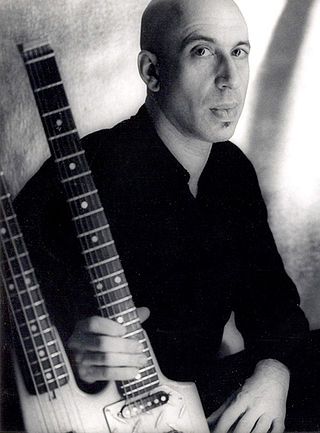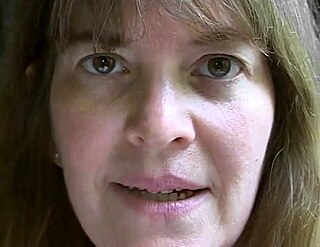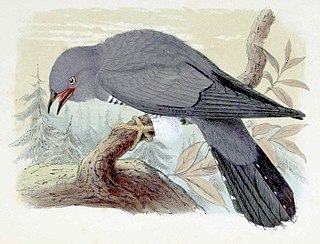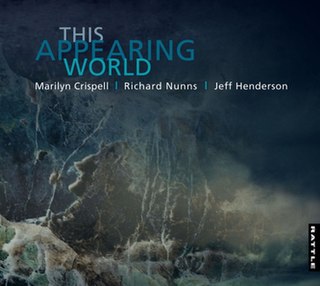Related Research Articles

The cicadas are a superfamily, the Cicadoidea, of insects in the order Hemiptera. They are in the suborder Auchenorrhyncha, along with smaller jumping bugs such as leafhoppers and froghoppers. The superfamily is divided into two families, the Tettigarctidae, with two species in Australia, and the Cicadidae, with more than 3,000 species described from around the world; many species remain undescribed. Nearly all of cicada species are annual cicadas with the exception of the few North American periodical cicada species, genus Magicicada, which in a given region emerge en masse every 13 or 17 years.
Mark Dresser is an American double bass player and composer.

Elliott Sharp is an American contemporary classical composer, multi-instrumentalist, performer, author, and visual artist.

Evan Shaw Parker is a British tenor and soprano saxophone player who plays free improvisation.

Joseph Salvatore Lovano is an American jazz multi-instrumentalist. Though best known as a tenor saxophonist, Lovano has also recorded on alto clarinet, flute and drums, amongst other instruments. He has earned a Grammy Award and several mentions in Down Beat magazine's critics' & readers' polls. His wife is singer Judi Silvano, with whom he records and performs. Lovano was a longtime member of the late drummer Paul Motian‘s trio alongside guitarist Bill Frisell.
Zoomusicology is the study of the musical aspects of sound and communication as produced and perceived by animals. It is a field of musicology and zoology, and is a type of zoosemiotics. Zoomusicology as a field dates to François-Bernard Mâche's 1983 book Music, Myth, and Nature, or the Dolphins of Arion, and has been developed more recently by scholars such as Dario Martinelli, David Rothenberg, Hollis Taylor, David Teie, and Emily Doolittle.

Marilyn Crispell is an American jazz pianist and composer. Scott Yanow described her as "a powerful player... who has her own way of using space... She is near the top of her field." Jon Pareles of The New York Times wrote: "Hearing Marilyn Crispell play solo piano is like monitoring an active volcano... She is one of a very few pianists who rise to the challenge of free jazz." In addition to her own extensive work as a soloist or bandleader, Crispell is also known as a longtime member of saxophonist Anthony Braxton's quartet in the 1980s and '90s.
Biomusic is a form of experimental music which deals with sounds created or performed by non-humans. The definition is also sometimes extended to include sounds made by humans in a directly biological way. For instance, music that is created by the brain waves of the composer can also be called biomusic as can music created by the human body without the use of tools or instruments that are not part of the body.

Paul Lytton is an English free jazz and free improvising percussionist.
buddy's knife jazzedition is a book publisher in Cologne, Germany that specializes in the publication of jazz books. It was established in 2007 by editor and ethnologist Renate Da Rin.

Vignettes is a solo album by American jazz pianist Marilyn Crispell recorded in April 2007 and released on ECM later that same year.

Storyteller is an album by the Marilyn Crispell Trio, featuring rhythm section Mark Helias and Paul Motian, recorded in February 2003 and released on ECM April the following year.

Insects have appeared in music from Rimsky-Korsakov's "Flight of the Bumblebee" to such popular songs as "Blue-tailed Fly" and the folk song La Cucaracha which is about a cockroach. Insect groups mentioned include bees, ants, flies and the various singing insects such as cicadas, crickets, and beetles, while other songs refer to bugs in general.

Birdsong has played a role in Western classical music since at least the 14th century, when composers such as Jean Vaillant quoted birdsong in some of their compositions. Among the birds whose song is most often used in music are the nightingale and the cuckoo.
Korhan Erel is a musician, improviser, sound designer based in Berlin.

And Your Ivory Voice Sings is an album by pianist Marilyn Crispell and drummer Doug James. It was recorded at the Woodstock Recording Studio in Woodstock, N.Y, in March 1985 and was released later that year by Leo Records.

Overlapping Hands: Eight Segments is a live album by pianists Marilyn Crispell and Irène Schweizer. It was recorded at the Workshop Freie Musik, Akademie der Künste in Berlin in June 1990, and was released in 1991 by FMP.

One Dark Night I Left My Silent House is an album by pianist Marilyn Crispell and clarinetist David Rothenberg, recorded in March 2008 and released on ECM in 2010. The album, which is entirely improvised, is named after Peter Handke's novel In einer dunklen Nacht ging ich aus meinem stillen Haus. In addition to playing piano, Crispell also employs percussion instruments and "an old beat-up piano soundboard wrenched out of an old baby grand."

This Appearing World is a live album by pianist Marilyn Crispell, Māori traditional instrumentalist Richard Nunns, and reed player Jeff Henderson. It was recorded in Auckland, New Zealand, in August 2008 and was released in 2011 by Rattle Records. The album comes with a DVD containing a video of the performance, plus an interview.

Azure is an album by bassist Gary Peacock and pianist Marilyn Crispell. It was recorded at Nevessa Production in Saugerties, New York in January and February 2011, and was released on ECM in 2013.
References
- 1 2 3 4 "Experts Guide: David B Rothenburg". New Jersey Institute of Technology. Retrieved 23 May 2013.
- 1 2 3 Dreifus, Claudia (20 September 2005). "A conversation with David Rothenberg; Ode With a Nightingale, and a Thrush, and a Lyrebird". The New York Times. Retrieved 19 June 2011.
- 1 2 3 Reich, Ronni (15 October 2010). "NJIT professor finds nothing cuckoo in serenading our feathered friends". Star Ledger. Retrieved 19 June 2011.
- 1 2 Revkin, Andrew (17 June 2011). "Sax and Cicadas – An Interspecies Jam". The New York Times. Retrieved 18 June 2011.
- ↑ Rothenberg, David (2011). Survival of the Beautiful. Bloomsbury. p. 312.
- 1 2 "Invertebrate Sound and Vibration 13th International Meeting" (PDF). University of Missouri. p. xiii. Archived from the original (PDF) on 18 August 2011. Retrieved 18 June 2011.
- ↑ Hoare, Philip (25 July 2008). "Whale music in a sea of sound". The Daily Telegraph. London. Retrieved 20 June 2011.
- ↑ Rothenberg, David (November 2011). Amazon entry for Survival of the Beautiful. Bloomsbury USA. ISBN 978-1608192168.
- ↑ Forbes, Peter (10 February 2012). "The Guardian". Survival of the Beautiful by David Rothenberg - review. London. Retrieved 7 December 2012.
- ↑ Rothenberg, David. "Bug Music". Terrain.org. Archived from the original on 11 June 2011. Retrieved 20 June 2011.
- ↑ Rothenberg, David (2019). Nightingales in Berlin. University of Chicago Press. ISBN 978-0226467184.
- ↑ About, TerraNovaMusic.net. Retrieved 2018-02-11.
- ↑ "David Rothenberg Nobody Could Explain It". AllMusic. Retrieved 8 April 2018.
- 1 2 "Other Rothenberg Releases", TerraNovaMusic.net. Retrieved 2018-02-11.
- ↑ "TN0503 Why Birds Sing", TerraNovaMusic.net. Retrieved 2018-02-11.
- ↑ "TN0601 Sudden Music", TerraNovaMusic.net. Retrieved 2018-02-11.
- ↑ "TN0804 Whale Music", TerraNovaMusic.net. Retrieved 2018-02-11.
- ↑ "TN0906 Whale Music Remixed", TerraNovaMusic.net. Retrieved 2018-02-11.
- ↑ "TN1107 Expulsion of the Triumphant Beast", TerraNovaMusic.net. Retrieved 2018-02-11.
- ↑ "TN1309 Bug Music", TerraNovaMusic.net. Retrieved 2018-02-11.
- ↑ "TN1410 Cicada Dream Band", TerraNovaMusic.net. Retrieved 2018-02-11.
- ↑ "TN1511 Berlin Bülbül", TerraNovaMusic.net. Retrieved 2018-02-11.
- ↑ "TN1512 And Vex the Nightingale", TerraNovaMusic.net. Retrieved 2018-02-11.
- ↑ "David among Dolphin Embassy's ambassadors" . Retrieved 6 April 2020.
- ↑ "Full credits of the "Intraterrestrial" movie". IMDb . Retrieved 6 April 2020.
- ↑ "Full credits of the "Sparky" animation". IMDb . Retrieved 6 April 2020.
- ↑ "Full credits of the "Divine Sparks" animation". IMDb . Retrieved 6 April 2020.
- ↑ "Full credits of the "Whales" drama". IMDb . Retrieved 6 April 2020.
- ↑ Eriksson, Magnus (5 May 2010). "Jazz: Marilyn Crispell & David Rothenberg - One dark night I left my silent house". Svenska Dagbladet. Retrieved 23 May 2013.
- ↑ Fordham, John (27 May 2010). "Marilyn Crispell/ David Rothenberg: One Dark Night I Left My Silent House". The Guardian. London.
- ↑ Kelman, John (16 June 2010). "[Review:] Marilyn Crispell / David Rothenberg: One Dark Night I Left My Silent House". All About Jazz.